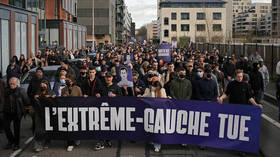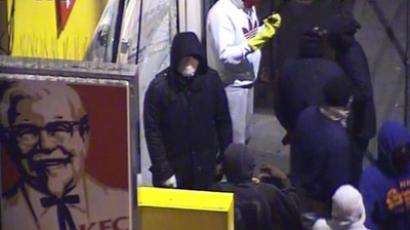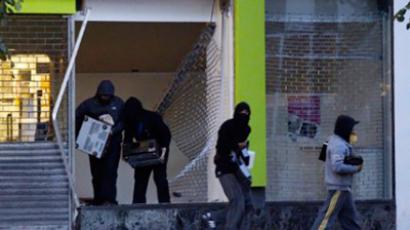No magic pill for British riot “sickness”
Though British top officials blame criminal aspirations for the nights of riots in the UK, locals from the violence-struck areas say the government's budget policy is forcing youths towards crime.
Prime Minister David Cameron talked tough on Wednesday, branding pockets of society “sick”, and pledging to reform them. “Whatever resources the police need, they will get. Whatever tactics the police feel they need to employ, they will have legal backing to do so. We will do whatever is necessary to restore law and order onto our streets,” pledged the PM. But seemingly unlike Cameron, people who live in the country’s poorest communities saw this unrest coming, exacerbated by government policy. “I think certain things that we had, like swimming, used to be free; and stuff like that gave a place for children to go. And cuts and stuff don’t give opportunities to children that are less fortunate to go and enjoy stuff in holidays, so they resort to causing havoc,” a teenager told RT in London. “You can’t blame the youth for being fed up and feeling disenfranchised and feeling there’s nothing for them to do, because there doesn’t seem to be anything for them – there are no jobs, nowhere for them to go, apart from hang around on street corners,” said another interviewee. The current sickness is not quickly cured: it links to years of liberal policies resulting in an underclass of young people who do not equate rights with responsibilities. Antisocial behavior results in a court order seen by many as a badge of honor. Schooling in deprived areas is disrupted by bad behavior. Teachers no longer have recourse to punishment and cannot count on support from parents.“Sort out the youth! They need calming down. I dunno what they need, they need to be controlled – where’s the parents? Where’s the parents in all this?” asks a London resident.The thoughts are echoed by other Londoners:“You’ve got a lot of youths with nothing to do, and the schemes that are set in place to help them have something to do are getting axed by the council through shortage of funds,” RT has been told by a man in a London street.One of those schemes being cut is the bus, which goes round the housing estates in Hackney providing much-needed resources and encouragement to young people. There used to be two such buses, but now there is no money to pay staff. So because of government cutbacks, the team can only reach half the youngsters they used to.“If they are deemed to be failing school because they have not met the criteria or have not jumped through the hoops of 7 GCSEs [British standard exams –Ed.], they then go on to feel that they have not achieved anything in life, their aspirations change, and in the result they often delve into criminality or drugs, or just become a burden on society,” says a Hackney youth worker.Youth unemployment in Hackney, East London, runs at over 30 per cent. Parts of the borough are fairly affluent, so it is reasonable to assume that figure rises substantially when it comes to these council estates. It has become a culture that in some cases it is more profitable to stay at home and claim benefits than it is to go out and work for a living.“There are jobs there if they wanted to do them. Most jobs are in pubs, in shops – everywhere you go, they are filled by Eastern Europeans, who are highly educated, who actually speak the language, and they are getting the jobs. Our own people are not getting them, very often because they are not interested in education and they don’t really want to work,” explains MEP Gerard Batten.The problem of marginalized youth is not a quick fix, and as such it is also not an election winner. So once this immediate situation is under control, it will be interesting to see what the government does to fix the “sickness” in this society. If the answer is nothing, it should be no surprise to see violence flare again, and in youth from all walks of life.














